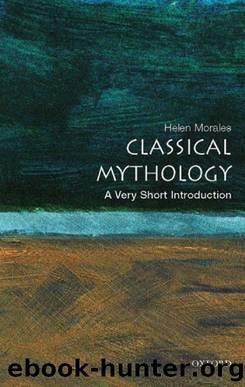Classical mythology: a very short introduction by Helen Morales

Author:Helen Morales [Morales, Helen]
Language: eng
Format: epub
ISBN: 9780192804761
Publisher: Oxford University Press
Published: 2007-09-15T04:00:00+00:00
Chapter 5
On the analystâs couch
âHe who knew the famous riddle â¦â
In 1906, on the occasion of his 50th birthday, Sigmund Freud, Viennese neurologist and founder of psychoanalysis, was presented by a group of his supporters with a bronze medallion. On one side was engraved a portrait of Freud, in profi le. On the other, an image of the mythic hero Oedipus, facing the Sphinx. To the right of Oedipus appears a line in Greek: âHe who knew the famous riddle and was a most powerful man.â
The Greek, a quotation from the ancient Greek play Oedipus the King by Sophocles, refers to Oedipus. A descendant of Europaâs brother Cadmus, Oedipus destroyed the Sphinx, a monstrous woman-lion-bird who was terrorizing the city of Thebes, when he solved her riddle: âWhich creature in the morning goes on four feet, at midday on two, and in the evening upon three?â The answer is âManâ (who in the morning of life crawls on all fours, in mid-life walks on two feet, and in the twilight of his years uses a
âthird footâ, a cane). So it was that he âknew the famous riddleâ and, when given leadership of Thebes by the grateful city, became âa most powerful manâ.
But the inscription, of course, also describes Freud. Two riddles fascinated Freud. The fi rst, for which he is less well known, was 68
how to account for the power of myth, especially as told in Greek tragedies, to move a modern audience. The second was that of the mind, how it worked and why it sometimes went wrong. In 1927, in the postscript to his book The Question of Lay Analysis, he wrote: âIn my youth I felt an overpowering need to understand something of the riddles of the world in which we live and perhaps even to contribute something to their solution.â His answers, which, as we shall see, were in no small part infl uenced by classical mythology, and which involved ideas such as that humans have âunconsciousâ and âsubconsciousâ parts of the mind and that we sometimes repress our sexual desires, were so infl uential that they made Freud one of the most powerful men of the 20th century.
Psychoanalysis and Greek mythology are two sides of the same O
medallion. To put it differently: without classical mythology, n the analyst
there would be no psychoanalysis. If that seems like too bold a statement, this chapter aims to show that it is not. It will look at the dynamic relationship forged between psychoanalysis and
âs c
o
classical myth, and the impacts, positive and negative, that each uc
h
has made upon the other. There are numerous psychoanalytic theorists, but Freud necessarily takes centre stage. Like many in 19th-century Germany, Freud was passionate about ancient Greece and its myths. He was both an analyst of the psyche, or mind (using Greek myth) and of Greek myth (using the psyche). As a result, he initiated a radical new method of enquiry, psychoanalysis, and wrote a momentous chapter in the history of classical mythology.
Know thyself
Freud used
Download
This site does not store any files on its server. We only index and link to content provided by other sites. Please contact the content providers to delete copyright contents if any and email us, we'll remove relevant links or contents immediately.
Kathy Andrews Collection by Kathy Andrews(11276)
The remains of the day by Kazuo Ishiguro(8338)
Paper Towns by Green John(4753)
Spare by Prince Harry The Duke of Sussex(4747)
The Body: A Guide for Occupants by Bill Bryson(4538)
Industrial Automation from Scratch: A hands-on guide to using sensors, actuators, PLCs, HMIs, and SCADA to automate industrial processes by Olushola Akande(4427)
Be in a Treehouse by Pete Nelson(3621)
Harry Potter and the Goblet Of Fire by J.K. Rowling(3579)
Never by Ken Follett(3489)
Machine Learning at Scale with H2O by Gregory Keys | David Whiting(3436)
Goodbye Paradise(3413)
The Remains of the Day by Kazuo Ishiguro(3100)
Into Thin Air by Jon Krakauer(3099)
The Cellar by Natasha Preston(3058)
The Genius of Japanese Carpentry by Azby Brown(3010)
Drawing Shortcuts: Developing Quick Drawing Skills Using Today's Technology by Leggitt Jim(2910)
120 Days of Sodom by Marquis de Sade(2906)
Fairy Tale by Stephen King(2855)
The Man Who Died Twice by Richard Osman(2777)
